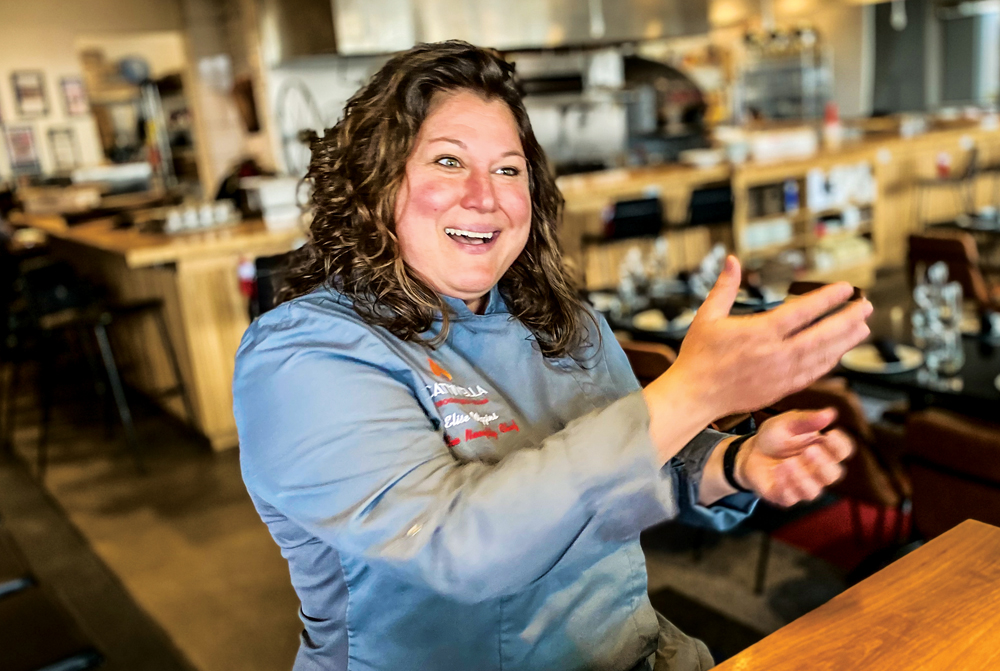
Elise Wiggins, Stapleton resident, chef and owner of Cattivella shares a sneak preview of her new program, Roots to Ranches, premiering on RMPBS in January. Wiggins talks about her vision for her latest enterprise, which centers on sustainably ranched, foraged, hunted and farmed foods and includes her unique spin on the traditional cooking show.
Executive Chef/Owner of Cattivella Elise Wiggins was only six years old the first time she went hunting with her father in the woods of Louisiana where she grew up. “If you do this, you have to understand we don’t take life to take life. If we take life, you will eat it. Are you ok with that?” she recalls her father asking. He helped her hold the shotgun, which was large for a little girl. “I took the shot, and we got the blackbird.” After showing her how to clean the bird, they cooked it and ate it together. “I remember the process as if it were right now. To this day, I can feel the blackbird in my hand,” she says. “It was a very special moment. I was hooked.”
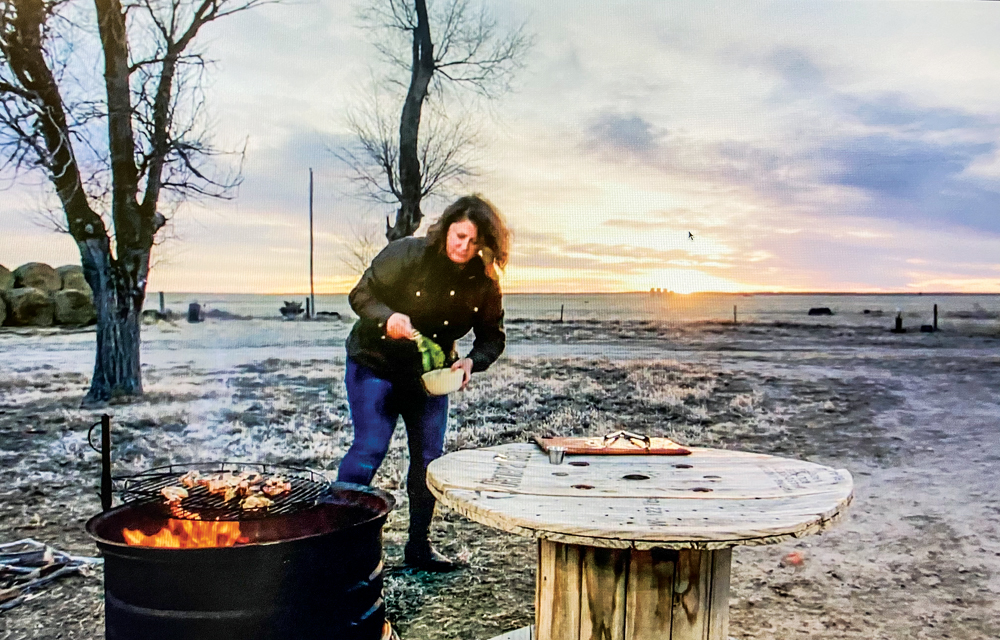
Season 2 of Roots to Ranches travels through the Rocky Mountain West, including this, the KB Styles Adventures Ranch in Kiowa County, Colorado. Here, Wiggins prepares rabbit outdoors, suggesting the spirit of adventure and creativity that distinguishes her program from the current menu of cooking shows. Wiggins hopes her show educates people about the origins of their food as well as local fare across the country, as each season moves to a different region and centers on a different food source. Photo courtesy of Roots to Ranches.
Though Wiggins’ first love is cooking—she was obsessed with Julia Childs’ show from age four on—she is passionate about hunting and the origins of food as well. Her new venture—Roots to Ranches—is a cooking show that rejects the genre’s predictable studio sets and domesticated approach to food. It combines her passion for cooking with her love of adventure and family storytelling traditions. Roots to Ranches moves through different states and regions while hunting, foraging, ranching, and farming for food according to the seasons.
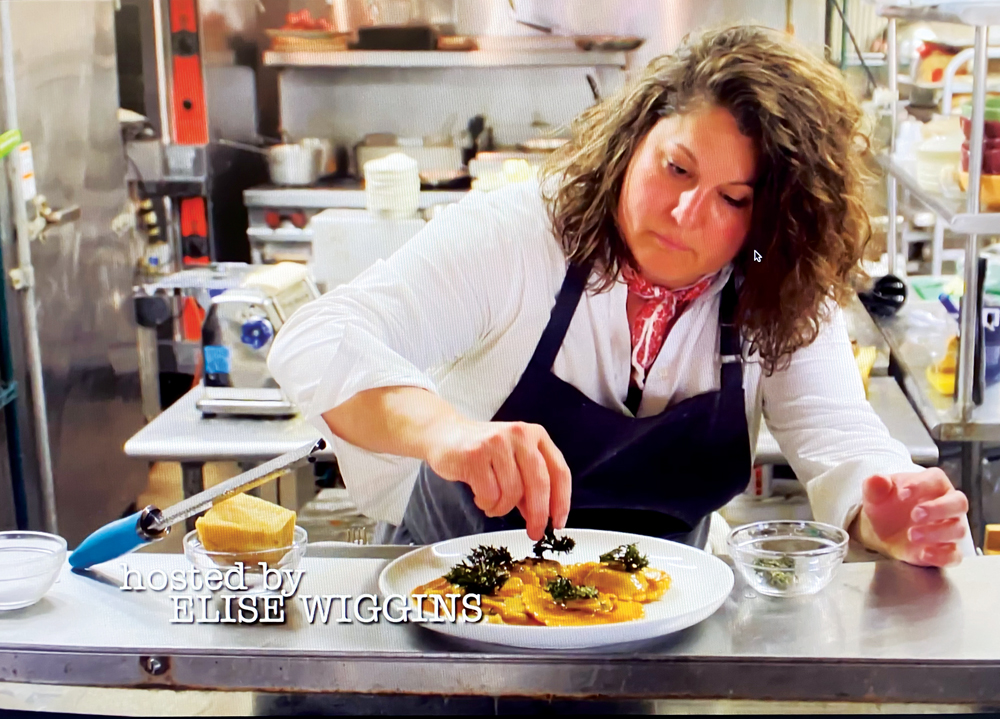
Wiggins, executive chef/owner of Cattivella in the Eastbridge Town Center, is just at home in the kitchen as she is in front of the camera. Photo courtesy of Roots to Ranches.
Roots to Ranches’ first season is a tour of the South, including Louisiana, Georgia, Alabama, and Texas. “Hurry up and wait for something to happen to capture that moment that will help tell the story you’re trying to tell,” is how producer Jared Petsche describes filming the first season of six episodes over two weeks in 2019. Icicles formed on Petsche’s mustache as he stood chest-deep in icy water, video camera patiently aimed at the sky, waiting for the perfect shot of birds in flight for one episode. Filming on location rather than on a stage in a scripted production is just one of the many elements that distinguishes Roots to Ranches from existing cooking shows.
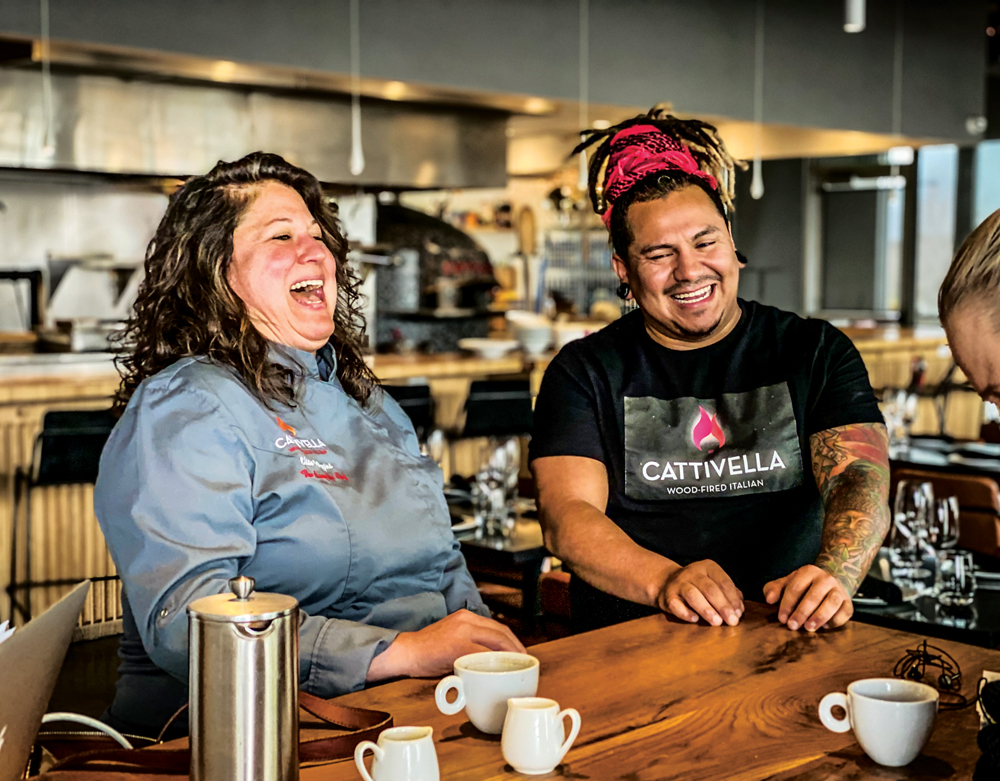
Cattivella owner and chef Elise Wiggins and Sous Chef Zuri Resendiz recount his first hunting experience in the deep woods of Louisiana, part of episode one of Wiggins’ new cooking show, Roots to Ranches. The program premieres on Rocky Mountain PBS in late January, airing Thursday nights. Check local listings for air times.
Each program focuses on a different place and a unique food, eventually leading to Wiggins preparing dishes that she hopes will expand viewers’ creativity and knowledge while also connecting them to the origins of their food. After watching her program, she hopes viewers will consider the sources of their food as they plan their own dinner menus.
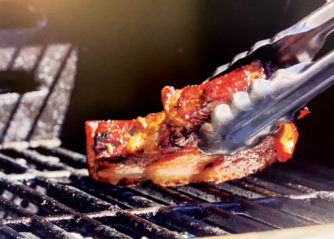
Photo courtesy of Roots to Ranches.
“I would rather have an animal that has had a full life in the wild without hormones, eating what’s natural….” than domesticated protein, she says, alluding to factory farming practices common in the U.S. “We can eat beef and not feel guilty by giving them enough space to be natural.” Wiggins says wild game has a higher protein content and foraged food has a higher nutritional content than their counterparts in a grocery store or farmers’ market. But not everything she prepares on Roots to Ranches is available in your local supermarket.
Squirrel is the focus of the first episode, which she screened before a November audience at the Sie Film Center. Guests sampled several varieties of this staple of traditional Louisiana cuisine before viewing the pilot, in which Cattivella Sous Chef Zuri Resendiz joins Wiggins to go squirrel hunting. This entire sequence is funny and engaging; the pair share a natural chemistry on camera. Though admittedly outside of his comfort zone in the insect-rich deep woods of springtime Louisiana, the Mexico City native says he hopes to go for “something bigger than a squirrel” next time he goes hunting. “As a chef, we’re spoiled; maybe we get whole animals, but they’re already clean….going in there in the woods and doing it yourself…it’s something we have lost contact with,” says Resendiz.
Beyond the adventure implicit in hunting or foraging, the show includes anecdotes reminiscent of the Wiggins’ family tradition of storytelling. At the premier, Wiggins shared the story of a “mixed fry” her grandmother once served. Excited to find a large “nugget” among the meats, Wiggins saved it for last. When she hit bone, she peeled off the breading and discovered a squirrel head. She assumed it had accidentally landed in the mixed fry. “Nope, that’s good eating,” said her grandfather as he instructed her how to crack the bone and scoop out the meat. “In my family, you eat everything. You don’t waste anything,” she smiles.
Wiggins’ stories and wit engage viewers even as she is herself learning along with her audience. Foraging, she concedes, is outside of her skill set, so she finds local experts to teach her the nuances of searching for lichen and Queen Anne’s Lace. With each new food she tries, she imagines complementary flavors, likening her creative process to composing a symphony. Not everything is exotic, however; much of what we consider off-limits for consumption, Wiggins deems flavorful, nutritious, and locally abundant. She finds inspiration in Stapleton’s Central Park, for example, which is replete with purslane, mallow, and dandelions.
Season two, scheduled to air in the summer of 2020, is a tour of the Rocky Mountain West including Colorado, New Mexico and Utah. She devotes an entire episode to The Urban Farm at Stapleton, which she praises for its educational programming and organic farming. Though she appreciates that most viewers will never prepare squirrel for dinner, Wiggins hopes Roots to Ranches connects people to their food and becomes “aspirational,” the way Julia Childs’ program was for generations.
Roots to Ranches premieres on RMPBS in late January. Check local listings for times.
Front Porch photos by Steve Larson



0 Comments